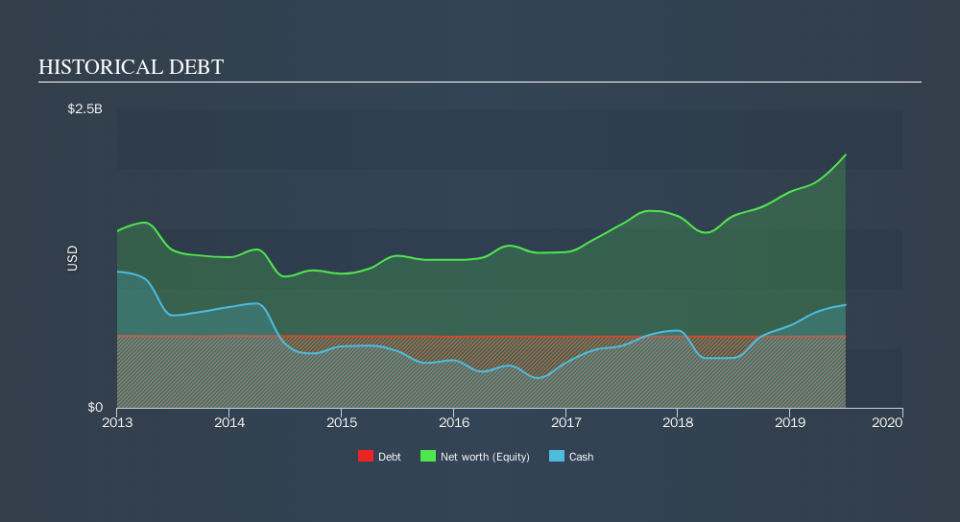Is NVR (NYSE:NVR) A Risky Investment?

The external fund manager backed by Berkshire Hathaway's Charlie Munger, Li Lu, makes no bones about it when he says 'The biggest investment risk is not the volatility of prices, but whether you will suffer a permanent loss of capital. When we think about how risky a company is, we always like to look at its use of debt, since debt overload can lead to ruin. We can see that NVR, Inc. (NYSE:NVR) does use debt in its business. But is this debt a concern to shareholders?
Why Does Debt Bring Risk?
Debt and other liabilities become risky for a business when it cannot easily fulfill those obligations, either with free cash flow or by raising capital at an attractive price. If things get really bad, the lenders can take control of the business. However, a more usual (but still expensive) situation is where a company must dilute shareholders at a cheap share price simply to get debt under control. By replacing dilution, though, debt can be an extremely good tool for businesses that need capital to invest in growth at high rates of return. When we think about a company's use of debt, we first look at cash and debt together.
View our latest analysis for NVR
What Is NVR's Debt?
As you can see below, NVR had US$598.0m of debt, at June 2019, which is about the same the year before. You can click the chart for greater detail. But it also has US$861.3m in cash to offset that, meaning it has US$263.3m net cash.
How Strong Is NVR's Balance Sheet?
Zooming in on the latest balance sheet data, we can see that NVR had liabilities of US$647.1m due within 12 months and liabilities of US$836.7m due beyond that. Offsetting this, it had US$861.3m in cash and US$28.9m in receivables that were due within 12 months. So its liabilities total US$593.6m more than the combination of its cash and short-term receivables.
Of course, NVR has a titanic market capitalization of US$13.1b, so these liabilities are probably manageable. But there are sufficient liabilities that we would certainly recommend shareholders continue to monitor the balance sheet, going forward. While it does have liabilities worth noting, NVR also has more cash than debt, so we're pretty confident it can manage its debt safely.
Fortunately, NVR grew its EBIT by 6.2% in the last year, making that debt load look even more manageable. The balance sheet is clearly the area to focus on when you are analysing debt. But ultimately the future profitability of the business will decide if NVR can strengthen its balance sheet over time. So if you want to see what the professionals think, you might find this free report on analyst profit forecasts to be interesting.
Finally, a business needs free cash flow to pay off debt; accounting profits just don't cut it. While NVR has net cash on its balance sheet, it's still worth taking a look at its ability to convert earnings before interest and tax (EBIT) to free cash flow, to help us understand how quickly it is building (or eroding) that cash balance. Over the most recent three years, NVR recorded free cash flow worth 70% of its EBIT, which is around normal, given free cash flow excludes interest and tax. This cold hard cash means it can reduce its debt when it wants to.
Summing up
We could understand if investors are concerned about NVR's liabilities, but we can be reassured by the fact it has has net cash of US$263.3m. The cherry on top was that in converted 70% of that EBIT to free cash flow, bringing in US$835m. So we don't think NVR's use of debt is risky. Over time, share prices tend to follow earnings per share, so if you're interested in NVR, you may well want to click here to check an interactive graph of its earnings per share history.
When all is said and done, sometimes its easier to focus on companies that don't even need debt. Readers can access a list of growth stocks with zero net debt 100% free, right now.
We aim to bring you long-term focused research analysis driven by fundamental data. Note that our analysis may not factor in the latest price-sensitive company announcements or qualitative material.
If you spot an error that warrants correction, please contact the editor at editorial-team@simplywallst.com. This article by Simply Wall St is general in nature. It does not constitute a recommendation to buy or sell any stock, and does not take account of your objectives, or your financial situation. Simply Wall St has no position in the stocks mentioned. Thank you for reading.

 Yahoo Finance
Yahoo Finance 
